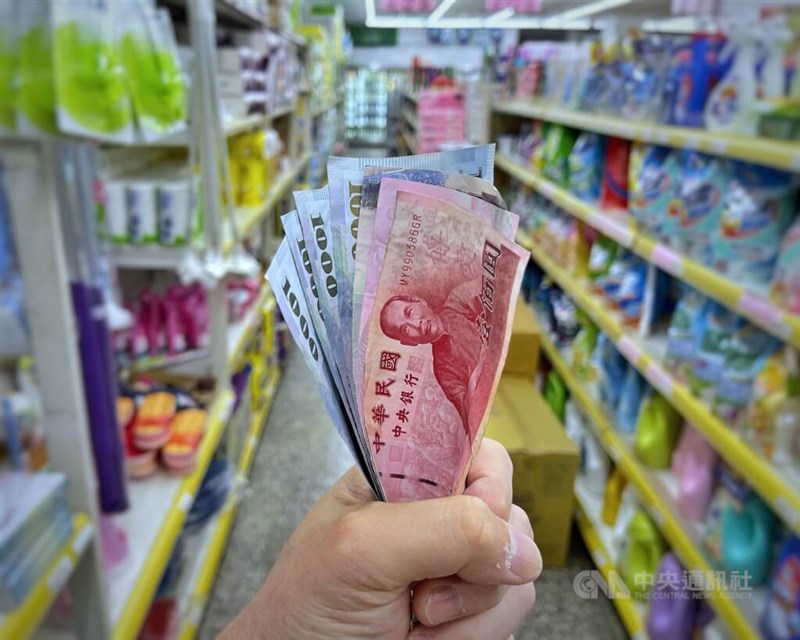
Taipei, Aug. 17 (CNA) Though the government recently raised its 2025 GDP growth forecast to 4.45 percent due to stronger-than-expected AI-driven exports, economists warned that American tariffs and weak domestic consumption could hurt growth momentum in the coming months.
The United States imposed a baseline tariff of 20 percent on goods made in Taiwan that took effect on Aug. 7, higher than the 15 percent tariffs imposed on goods made in Japan and South Korea, raising concern over the tariff's impact on Taiwan's economy.
Gordon Sun (孫明德), director of the Taiwan Institute of Economic Research (TIER) Economic Forecasting Center, said U.S. tariff policy remained a major uncertainty for Taiwan's economy, and the government needed to clearly assess its economic impact.
Sun felt, however, that Taiwan's exports would remain stable in the coming months because 70 percent of its exports are ICT products, which he said were currently unaffected by the U.S. tariffs.
The other 30 percent are exports of products from non-tech industries, which have come under pressure, Sun said, but most of those exports tend to go to China and Southeast Asia, not the U.S., and therefore should not be too badly affected.
In addition, the government has also introduced support programs for exporters and subsidies for affected industries, which he described as "insurance" to soften the blow.
The bigger economic challenge for Taiwan in the coming months is domestic demand, Sun argued.
Retail sales fell 0.4 percent year-on-year in the first half, and 2.9 percent in June alone, he said, citing data from the Ministry of Economic Affairs.
He cited two reasons for weak consumption -- uncertainty over the tariffs, which has delayed car purchases, and a cooling property market after government measures against speculation, which has hurt consumer confidence.
To boost confidence, the government must take more proactive measures, such as universal cash handouts to stimulate demand and monetary easing by the central bank, Sun said.
Dachrahn Wu (吳大任), director of the National Central University (NCU) Research Center for Taiwan Economic Development, warned that U.S. President Donald Trump's tariff policy is aimed at forcing companies to invest and produce in the U.S.
That could squeeze domestic investment and drive high-paying jobs overseas, severely damaging Taiwan's domestic demand, Wu said.
Reshaping supply chains
Chiou Jiunn-rong (邱俊榮), an economics professor at NCU, argued that businesses must be mentally prepared for a long struggle as tariffs have become the new normal, regardless of U.S. leadership.
He said Trump's broader tariff war could restructure supply chains and alter global business cycles, slowing growth for years, and while subsidies could help affected industries in the short term, they risked leaving uncompetitive industries stagnant.
In the longer run, Taiwan needs to consolidate its strength in semiconductors and also reinforce sectors less exposed to tariffs, including applications, software and smart systems, to maintain competitiveness amid economic uncertainty, Chiou said.
The scholars' comments came after the Directorate-General of Budget, Accounting and Statistics (DGBAS) Department of Statistics on Friday sharply raised its 2025 GDP growth forecast from 3.1 percent in May to 4.45 percent.
It attributed the upward revision to a surge in exports and private investment driven by strong AI demand.
The DGBAS, however, revised the growth of private consumption down to 0.85 percent. Of the 4.45 percent projected gains in GDP, net external demand contributed 2.71 percentage points of that, while private consumption contributed only 0.4 percentage points, the DGBAS said.
- Politics
Taiwan FM condemns political violence after Charlie Kirk's death
09/14/2025 09:48 PM - Sports
Huang Hsiao-wen wins World Boxing Championships, her 3rd career gold
09/14/2025 08:52 PM - Politics
Taiwan's defense resilience committee to hold international forum
09/14/2025 08:35 PM - Business
Taiwan sends agricultural buying mission to U.S.
09/14/2025 07:39 PM - Society
Tainan museum cherry blossoms bloom out of season
09/14/2025 07:07 PM